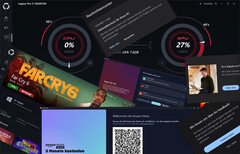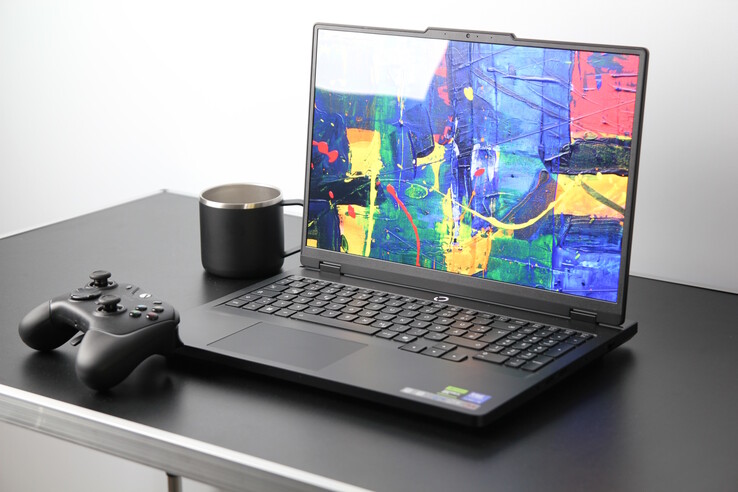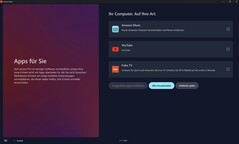Lenovo and other laptop makers abuse their control centers by placing ads, as seen on the Legion Pro 5

We'd rather discuss the actually well-made Lenovo Legion Pro 5 gaming laptop, which we have just reviewed. We'd love to talk about how it offers one of the fastest RTX 5070 Ti graphics cards in a 16-inch chassis that we've tested thus far. Or about its brilliant OLED display. We would also like to discuss its weaknesses, such as some of its somewhat outdated features.
However, one issue that we repeatedly noticed recently, particularly when testing Lenovo laptops, are the advertisements for various products directly on these laptops. This can’t be attributed to Microsoft Windows, but rather the manufacturers' own software. These proprietary software solutions are not only becoming more common, but they also serve more than just one basic purpose.
Lenovo isn't the only manufacturer to engage in this practice, but it sometimes appears particularly aggressive with its advertising, pre-installed trial software and growing amount of proprietary software. Collecting user data and displaying ads are potential revenue streams, so it doesn't take a genius to predict that other manufacturers will probably follow suit, unless this practice is curbed in time by official regulations revolting users. The AI boom is another factor contributing to additional, sometimes more or less useful proprietary software.
In the early days of gaming laptops, performance was primarily controlled by power and performance settings within the Windows operating system. Then, manufacturers began to develop their own software to offer additional performance modes such as silent, turbo or similar. Control centers were created and quickly became obligatory if users wanted to fully utilize their gaming laptop. By moving such originally standardized system settings into these control centers, users have little choice but to use them these days.
At the same time, these control centers not only offer users control over their laptops, but they also give manufacturers control over their customers. If every customer uses the software, it becomes an excellent tool for tracking customer behavior. Additionally, revenue can be increased by showing ads. Such opportunities are difficult for companies to ignore.
On Lenovo’s laptops, the control center is actually called Lenovo LegionSpace (performance settings for gaming notebooks) and Lenovo Vantage (support and minor settings). Users and reviewers who open LegionSpace to change their laptop's performance mode are greeted by the LegionSpace home screen. Every time it launches, it shows the latest offers for certain games, similar to what you'd find on Steam, the Epic Games Store or other launchers. The key difference is that LegionSpace isn't even a marketplace for games!
In Vantage, users are confronted with self-promotions for security solutions, warranty extensions and the like. They also try to push surveys, as if Lenovo doesn't get enough feedback from the data they collect.
Furthermore, Lenovo now offers various other proprietary and third-party software solutions. Of course, these are pre-installed and include a trial version of McAfee and Lenovo Now. Upon initial setup, users are bombarded with advertisements for Amazon (Music), YouTube, Norton, Fubo and similar services.
What about data collection? This situation is unclear, as Lenovo provides a link to the general privacy policy on its homepage. Even searching for a privacy policy specifically for Lenovo Vantage or Lenovo LegionSpace only brings up Lenovo’s usual privacy statement. This document lists virtually all data collected by Lenovo, including data gathered during visits on its website. Because the document encompasses all Lenovo services, it's outright huge. Therefore, it’s nearly impossible for an average user to find out exactly which data Lenovo LegionSpace or Vantage collects.
There might be users who aren't bothered by this. However, if they had a choice, many would probably prefer to opt out of data collection and advertising. Laptop manufacturers are currently making it increasingly difficult to do so. One can only hope that customers will eventually push back against excessive advertising and data harvesting and, if push comes to shove, choose alternative products that don't bother them with so much bloatware. However, proprietary AI software, AI agents and similar technologies could lead to even more uncertain data privacy in the medium term.
For me, Lenovo has already crossed that line. Even though the Legion Pro 5 that we reviewed is quite good, I'd lean towards other brands if I were making a personal purchase, and also recommend the same to friends. At least, that's until Lenovo and other manufacturers pump the brakes on their marketing ambitions and focus their philosophy on the customer and user experience rather than on additional revenue.


















